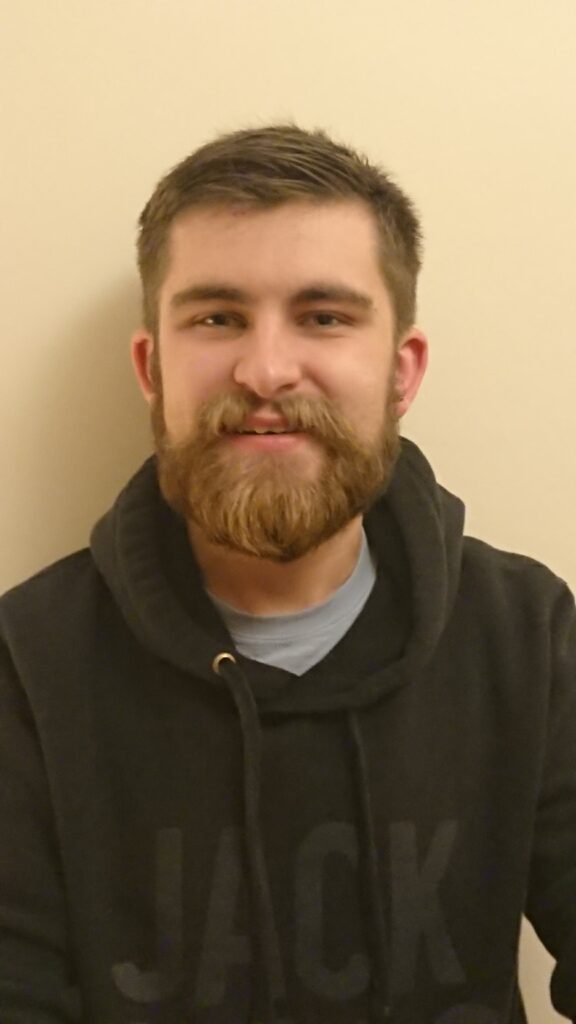
Many Welsh or Wales based arts graduates are finding this current period especially difficult. Their usual opportunities to meet agents, prepare for final year exhibitions or productions may take place later in the year or sadly not at all. To raise awareness of the diverse talent graduating this year GTC is offering any Welsh or Wales based graduate the opportunity to be showcased on our website. If you are interested, please do get in touch.
Hi Dave great to meet you, can you give our readers some background information on yourself please?
My name is Dave Humphreys. I’ve recently graduated from the University of Chester with a distinction in the MA Drama course, following straight on from the BA (Hons) Drama and Theatre Studies course.

I live in Buckley, Flintshire in North Wales. The majority of my theatrical background has been as a result of one place; Theatr Clwyd. I have been a part of Theatr Clwyd in some way for fifteen years; whether it has been a part of the old Clwyd Theatr Cymru Theatre for Young People (CTCTYP) weekly workshops co-ordinated by Tim Baker and Jane Meakin, Taskforce ran by Anne Plenderleith, which encouraged conversation about the theatre and wider arts, to performing in two professional productions. Firstly, The Suicide directed by Barry Kyle and later in Phillip Breen’s Cyrano de Bergerac. In addition, the work placement opportunities I have had there. My highlight was supporting, observing and being a small part of the pilot for Junior Justice in a Day, directed and facilitated by Emyr John. A key moment in my career path. Now, I am proudly a part of the team.
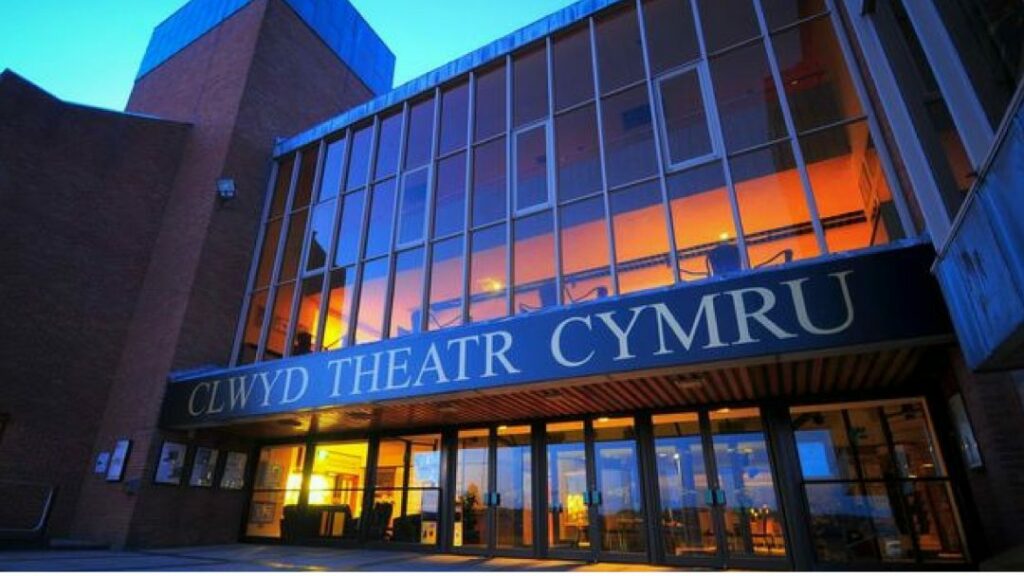
I have been working on a freelance basis for four and a half years for the Creative Engagement department, co-ordinated by Gwennan Mair, to deliver weekly workshops and outreach projects.
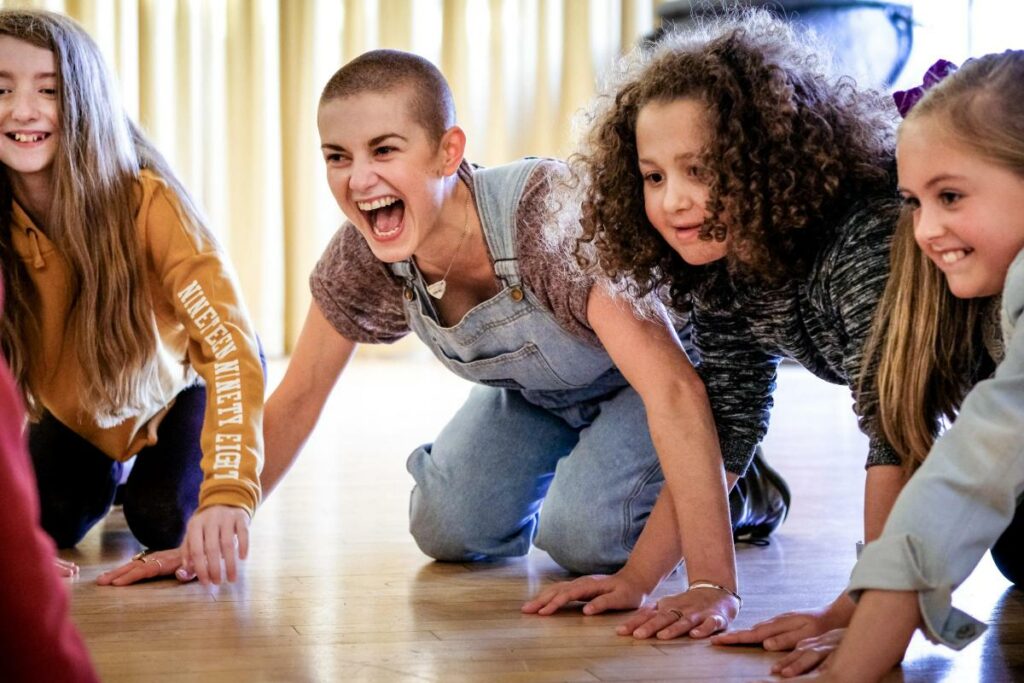
In a way, it has come full circle for me in that I now support the delivery of the work that inspired me to get to where I am. We deliver workshops for a range of people of all ages, abilities and backgrounds. By working with the amazing team, I get the chance to work week in, week out with wonderful groups and develop my people skills, which is handy for the career path I am following. But to work alongside so many different facilitators enables me to observe and take note of the way they work and how that influences my practice. The change I have seen from when I started fifteen years ago to now is just sensational to see and how much this theatre is pushing to deliver for its community.
Outside of Theatr Clwyd, I have performed at Storyhouse last year on two occasions; The Modern Prometheus, written and directed by Zoe Smith and A Crack Through Time by Clare Dudman. I have also carried out work for Minerva Arts Theatre, Chester with workshop cover and performing in their piece raising awareness of Loan Shark culture.
I have also devised, performed and written my own play; Lonely Together. Please follow the links to a video of the performance and also videos about my practice behind them. You can also visit www.dashoutreach.co.uk. There, an MA colleague and I, as part of our major practical, to see what it took to create an outreach theatre company. I must emphasise it is not an official theatre company, we are not working at this current time, but you can see what work we created together and the sort of workshops we would offer as a result of our collaboration during the MA course.
So, what got you interested in the arts?
For my eighth birthday, my mum recommended I join the CTCTYP workshops to see if I’d enjoy them. I’d seen pantos before then, but it was because of these workshops I became interested. I just loved the drama games, meeting new people, the chance to see theatre for free, to perform every term. And, as you can see above, lead onto many opportunities there. In fact, I didn’t study theatre in school until A-levels, so up to then, it was also where I would learn most about theatre.
Can you tell us about your creative process?
So, the videos links below will give readers some idea of how I work. There are a few quotes from Augusta Boal and Chris Johnston etc, but I’m a firm believer in contextualising my work.
My aim is to create work and pieces for communities. Whether it be Theatre in Education or Theatre for Young Audiences, I am always keen to ensure my work has a discussion element; l like to know the work I have created has sparked something in my audience. I suppose, as I tend to call it, this idea of theatre and discussion is my main goal. It may not have an education aim; the suicide piece as you will see cannot have an educative aim as there is no wrong way to support someone. Raising awareness is my aim, and actively see the affect it has had. My process has been hugely influenced by the writing of Chris Johnston and through observation of outreach work, specifically that created by Emyr John, Creative Engagement Associate, Theatr Clwyd.

From Johnston, his six polarities are my underlining foundation. These polarities are what Johnston considers to be crucial when carrying out workshops or creating theatre for everyday life. There are two which are at the forefront of my mind. Firstly, the fixed and free; as facilitators, we are constantly moving between these two polarities as to whether the discussion/activity/game can happen as it likes, but eventually that creativity becomes nothing. So, as a facilitator, a question or rule might be introduced to narrow the energy of the participants to get something out of them. When you watch the Lonely Together piece, there are elements of this in the post-show workshop. Secondly, from Johnston, is the centre and the edge. It is really important when we welcome in a group, that no one is at the centre of attention or that anyone feels left out. In that, the discussions must balance the participants’ input. Hence, sometimes I ask for those who say nothing, to bring the closer into that circle, that discussion. The use of ‘The Fish’ idea has been another huge influence. You will see this in my video on the devising process
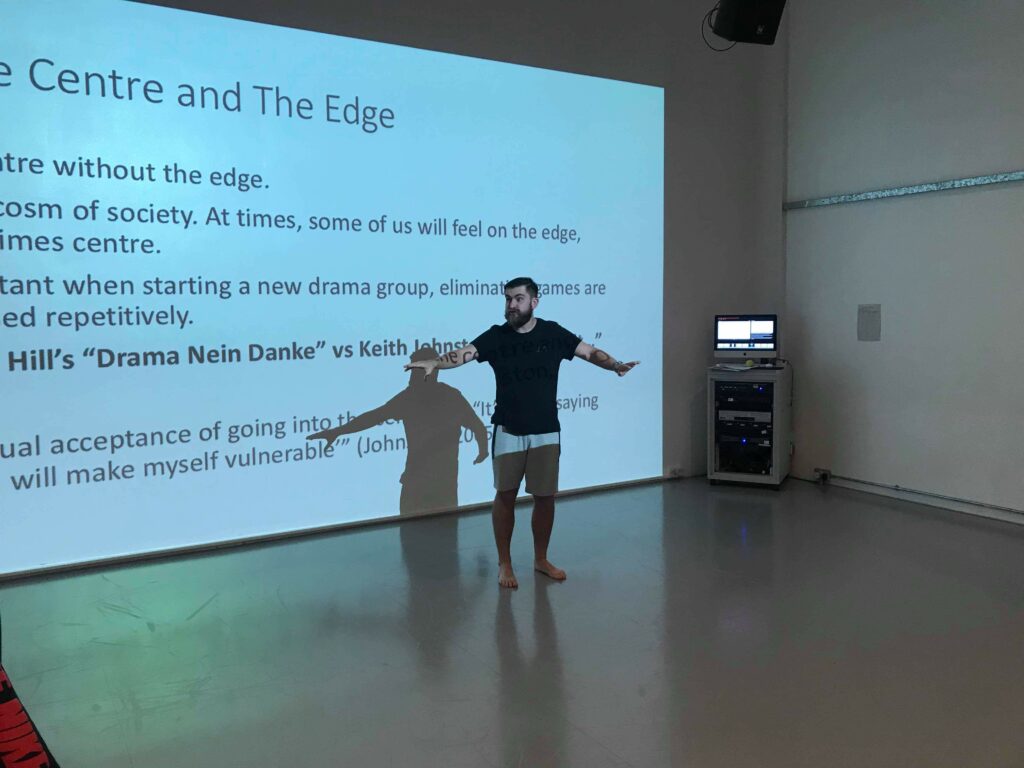
On a practical level, Emyr John has been an inspiration. I have been lucky enough to know Emyr since I started at Theatr Clwyd and he has welcomed me, echoing the spirit of the team, into the rehearsal space. I have seen how flexible he is when carrying out his work, how to work with young participants in both Junior Justice and Justice in a Day. With the knowledge of Johnston in mind, his work has enabled me to see it in practice. Plus, his years of experience is invaluable to me. I have been able to incorporate his work into mine, take on board the hints and tips he has shared (especially what to be cautious of) and him allowing me into rehearsal spaces. As a result, I have been able to complete a dissertation on the piece in the context of theatre in education in Wales.
As a young Welsh artists graduating during a very difficult period what investment and support do you think is required to enable your career to develop and prosper?
For me, the opportunity to collaborate is important. In these difficult times, we need to collaborate more than ever before. Theatre has probably never faced a tougher time on how to stay connected with audiences and continue to produce work, although that is just my perspective. For young artists, they need opportunities that not just offer Q&A’s or workshops, they need something that will allow them to get stuck in with it. I’m finding writing to be my thing at the moment; short monologues or audio plays for competitions. But I understand writing is not for everyone, so projects that enable us to collaborate with established artists.
I also believe that opportunities should encourage artists to think outside of the theme of ‘isolation’. I feel that it is too easy and can be personal. People may not want to discuss isolation and being at home; we don’t know what things people have going on. We should make projects based on historical events or themes that encourage audiences or participants to escape from those thoughts. That’s why people go to see theatre isn’t it? Escapism as well as entertainment. Besides, in the future, when we can go back to the theatre, the juxtaposition of live theatre with a focus on lockdown will surely be a better time to reflect. Right now, theatre needs to be there to help us mentally be free for an hour or so. Just my thoughts.
Link to performance and workshop of Lonely Together (does contain themes around suicide): https://youtu.be/U5dCVlURzMw
Link to video which shows a bit about my devising process behind Lonely Together: https://youtu.be/26yI6N7cq0Q
Link to video which shows the characterisation process behind Lonely Together: https://youtu.be/kXukIOUUBrg
A range of arts organisation and individuals are now working online or finding new ways to reach out to audiences. Have you seen any particularly good examples of this way of working?
Well, I will begin with Theatr Clwyd. Their Together campaign was launched very early on in lockdown, offering challenges and tasks to their online community week in week out.They have offered voices to those who may have been unheard.
They have offered voices to those who may have been unheard. Through their memories task, to the dancing task. It has allowed professional artists and members of their community to perform and create on the same stage. But it’s not just that. Behind the scenes, via Zoom, we are able to maintain the delivery of workshops to all our groups. And it is amazingly heart warming how much it means to them; I never get very emotional as a person, but when you get to check in with participants and see you’ve made them smile, it means a lot. We are just beginning to embark how we perform through Zoom with all these groups so exciting times ahead. Just a quick shout out to Clare, Laura, Alex, Liz, Owen, Hester, Nerys, Gwennan and the rest of the weekly workshop team for carrying on and adapting their practice to digital media to continue this wonderful work. It really is a joy to be a part of.
Beyond Theatr Clwyd, there has been two stand out theatres in Wales; FranWen with 120960 and Sherman with Ten, monologues which have been written beautifully and performed fantastically (Steffan Rhodri a personal favourite of mine).
But FranWen have been amazingly quick to get online and work with young people to offer an online performance.
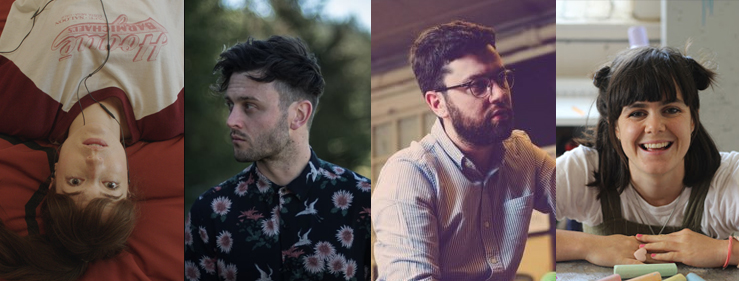
Now, I’m not Welsh speaking, but I’d certainly say this is one to watch. Beyond Wales, Theatre503 had a brilliant selection of ten minute pieces on their Rapid Write Response programme, two weeks ago I think.
If you were able to fund an area of the arts in Wales what would this be and why?
Workshops and outreach work. No doubt. I mean, the teaching of drama is important and as is the performances we see in theatres all over Wales. But I’d fallen in love with theatre and drama way before I started studying it and before I’d seen it. I loved it because it was accessible. By funding small and touring shows to go out into communities to perform or carry out workshops, then the earlier theatre can start influencing and having an impact of people’s lives. I’m not saying that every participant who takes part should become an actor or be involved in theatre, but I will say this from personal experience. My confidence, team work and communication skills would be no where near the standard they are now if I had not been a part of those workshops. It seems like easy work to those on outside of the work we carry out, but the effect a weekly workshop can have on someone in the long term is huge, I believe. I would highly recommend to people of all ages and ability to give workshops a go. Even if it is just one, that is still a huge achievement. In this current situation, it is just as important to be a part of them too. I have become part of a monthly one, meeting and hearing from new people and I am thoroughly enjoying it. Theatres need to ensure that online workshops can run if possible, it really makes a difference.
What excites you about the arts in Wales?
The exciting thing about arts in Wales is our passion for culture and language. As I’ve said, I’m not Welsh speaking, but the arts is the way forward to keeping the language alive in my opinion. From where I am from, bilingual work is a huge opportunity, where respect for both English and Welsh can be built. But the work of FranWen is so essential to keeping Welsh fresh. I was lucky enough to see Gethin Evans, now the Artistic Director of FranWen, work as assistant on Mold Riots and I felt that his respect towards the community cast, who were a mix of English and Welsh speaking, was amazing to see, so I think the work produced by FranWen in the future will be exciting and imperative to theatre in Wales.
But again, the awareness of culture is what is really exciting. At Theatr Clwyd, Mold Riots was a huge success for being a community story told by its community. Next, when it is safe to do so, is Project Hush. I was lucky enough to be on work placement for a week and saw the R&D for this. It is an amazing piece, telling of local stories and how that affected the wider world. And on site too. Taking theatre out of the theatre is always very exciting, and even more so in the Welsh countryside and historical areas. I was even part of a Greenfield summer school as support worker where we did a small site specific piece; the enjoyment had by all was great to see. I have always wanted to create a promenade piece about the Buckley Bomber; I’d love to see how I could do that, creating a piece that revives the Buckley dialect, the use of the locations and again broaden opportunities for community to work directly with professionals. Anyway, our love for culture and the language is what makes our arts great.
What was the last really great thing that you experienced that you would like to share with our readers?
Has to be Mold Riots at Theatr Clwyd. I was part of the chaperoning team from July, when rehearsals started, through to the performances. It was just monumental. A local story by local people (sounds a bit like League of Gentlemen that) where so many people were involved shows what theatre was really about. The end result was amazing; 100 people in wonderful costume taking audiences through the streets of Mold and giving passionate performances. You really could not tell the professionals apart in the end, it was that strong. But the process of getting to that point was unforgettable. The work and effort but into this piece by the professional team, the LX, wardrobe, creative team, the knitting groups. Kudos to Community Producer Alice Evans who did an amazing job to come in and co-ordinate this project. Seeing those young people be a part of something so young and as a group too. It reminded me of my time on The Suicide as an eleven year old. But I was on my own, not seeing the other performer often and trying to speak to the actors (who were lovely with me) but was still scary at that age. But due to the sheer size of Mold Riots, they could become friends and make great memories. What was better, they never argued between each other either, they looked after each other. I can only see how this experience made those 20-30 children happier. And, to me, that is what theatre is about. Experiences.
Thanks for your time Ed.
Thansk you can reach me at Twitter: @edhumphreys97 – much appreciate any feedback on this, Lonely Together videos or my dissertation.
